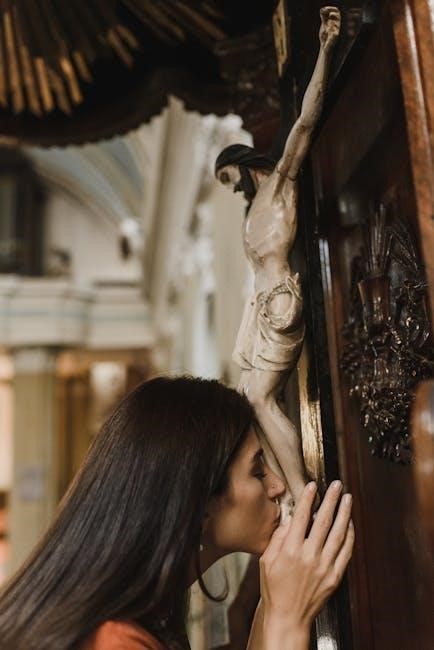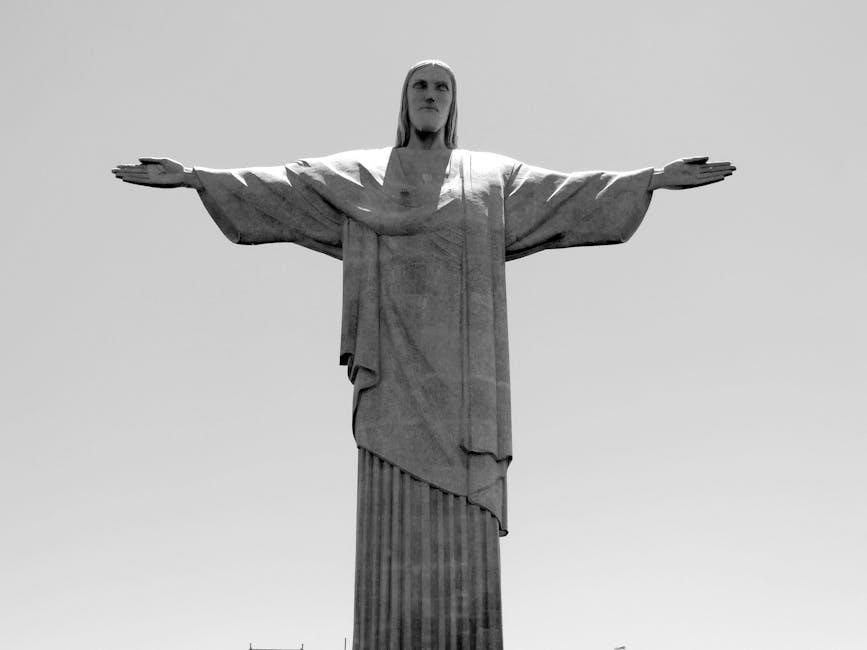The Profession of Faith in Catholicism is a solemn declaration of beliefs‚ rooted in the Nicene-Constantinopolitan Creed‚ affirming the Trinity‚ Jesus’ divinity‚ and the Church’s authority.
1.1 Definition and Significance
The Profession of Faith in Catholicism is a solemn declaration of beliefs‚ central to Catholic identity. It is rooted in the Nicene-Constantinopolitan Creed‚ affirming the Trinity‚ the divinity of Christ‚ and the Church’s authority. This profession is a public act of fidelity‚ expressing adherence to the teachings of the Catholic Church‚ guided by the Magisterium. It serves as a foundation for living out the faith authentically.
- It encapsulates the core doctrines of Catholicism.
- It emphasizes the unity of belief among the faithful.
- It is a commitment to follow Christ and His teachings.
1.2 Historical Context
The Profession of Faith traces its roots to early Christianity‚ with creeds like the Apostles’ Creed emerging as summaries of belief. The Council of Trent (1545-1563) formalized the Profession‚ emphasizing Catholic doctrines. In 1998‚ Pope John Paul II’s Motu Proprio Ad Tuendam Fidem updated the Profession‚ reflecting the Church’s enduring commitment to safeguarding the faith. This evolution highlights the Profession’s historical significance and ongoing relevance in Catholic tradition.
- Rooted in early Christian creeds.
- Formalized during the Council of Trent.
- Updated in 1998 to reflect contemporary needs.
1.3 Purpose of the Profession of Faith
The Profession of Faith serves as a public declaration of Catholic beliefs‚ affirming the Church’s teachings and fostering unity among the faithful. It is a commitment to uphold the doctrines of the Catholic Church‚ ensuring fidelity to its traditions and authority. This solemn act strengthens personal and communal faith‚ guiding believers in living according to Catholic principles.
- A public declaration of Catholic beliefs.
- Upholds the Church’s teachings and authority.
- Fosters unity and strengthens personal faith.
Key Components of the Catholic Profession of Faith
The Catholic Profession of Faith includes the Nicene and Apostles’ Creeds‚ affirming the Trinity‚ Christ’s divinity‚ and Church authority‚ while intertwining faith and reason for a holistic belief system.
2.1 The Nicene-Constantinopolitan Creed
The Nicene-Constantinopolitan Creed‚ established in 381 AD‚ is a cornerstone of Catholic faith‚ summarizing beliefs in the Trinity‚ Christ’s divinity‚ and the Holy Spirit. It is recited during Mass and serves as a unifying declaration of faith‚ reflecting the Church’s understanding of divine revelation and its commitment to preserving apostolic teachings across centuries.
2.2 The Apostles’ Creed
The Apostles’ Creed is a concise statement of Catholic faith‚ tracing its origins to the early Church. It affirms belief in one God‚ the Trinity‚ Jesus’ life‚ death‚ and resurrection‚ and the Church’s mission. Used in liturgy‚ prayer‚ and catechesis‚ it serves as a foundational profession of faith‚ distinguishing it from the Nicene Creed by its simplicity and historical roots in apostolic teachings.
2.3 The Relationship Between Faith and Reason
Faith and reason are complementary in Catholicism‚ guiding believers to understand divine truths. The Church emphasizes that faith seeks understanding‚ while reason‚ illumined by faith‚ explores supernatural truths. This harmony is central to Catholic theology‚ affirming that faith does not contradict reason but elevates it to comprehend God’s revelation more deeply.
The Magisterium ensures the integration of faith and reason‚ avoiding fideism or rationalism. This balance fosters a holistic understanding of Catholic teachings‚ enriching both spiritual and intellectual life.
The Role of the Magisterium in the Profession of Faith
The Magisterium safeguards Catholic doctrine‚ ensuring fidelity to divine revelation. It provides authoritative teachings‚ guiding the faithful in professing and living their faith authentically.
3.1 The Authority of the Catholic Church
The Catholic Church’s authority is grounded in its divine mission to teach and guide the faithful. Through the Magisterium‚ it interprets Scripture and Tradition‚ ensuring doctrines align with revealed truth. This authority is accepted by Catholics as a means of maintaining unity and preserving the integrity of the faith across generations.
3.2 The Catechism of the Catholic Church as a Resource
The Catechism of the Catholic Church serves as a comprehensive resource for understanding the Profession of Faith. It synthesizes Catholic doctrine‚ moral teachings‚ and liturgical practices‚ providing clarity and depth. It is a primary tool for catechesis and faith formation‚ aiding believers in embracing and living out their faith authentically and coherently.
Historical Development of the Profession of Faith

The Profession of Faith developed through key historical events‚ notably the Council of Trent and the Motu Proprio Ad Tuendam Fidem‚ shaping its doctrinal clarity and purpose over time.
4.1 The Council of Trent and Its Impact
The Council of Trent (1545–1563) significantly influenced the Profession of Faith by reaffirming Catholic doctrines‚ countering Protestant Reformation ideas‚ and establishing clear creeds. It emphasized sacraments‚ transubstantiation‚ and the authority of Tradition alongside Scripture‚ shaping the Tridentine Profession of Faith that remains foundational in Catholicism‚ ensuring doctrinal clarity and unity within the Church.
4.2 The Motu Proprio Ad Tuendam Fidem
The Motu Proprio Ad Tuendam Fidem‚ issued by Pope John Paul II in 1998‚ updated the Profession of Faith to include three levels of assent: matters of faith‚ truths definitively taught‚ and doctrines proposed in a non-definitive way. This reform clarified the hierarchy of truths‚ ensuring fidelity to Catholic doctrine while fostering theological reflection and unity within the Church.
The Profession of Faith in the Modern Church
The Profession of Faith remains vital in modern Catholicism‚ addressing contemporary challenges while affirming timeless truths. It inspires believers to live authentically and share their faith actively.
5.1 Contemporary Relevance and Challenges
The Profession of Faith remains central to Catholic identity‚ addressing modern challenges like secularism and religious pluralism. It guides believers in affirming timeless truths amidst evolving societal values. The Church emphasizes dialogue and education to maintain fidelity and relevance‚ ensuring the Profession of Faith continues to inspire and unite Catholics globally.
5.2 The Role of the Laity in Professing Faith
The laity play a vital role in professing and living the Catholic faith‚ fulfilling their baptismal call to evangelize and witness. They actively participate in sacraments‚ prayer‚ and community life‚ embodying the Gospel in daily life. Their commitment strengthens the Church’s mission‚ fostering a lived faith that inspires others and perpetuates Catholic traditions for future generations.

Comparative Analysis with Other Christian Traditions
The Catholic Profession of Faith shares common creeds with Eastern Orthodoxy and Protestantism but differs in authority structures and sacramental emphasis‚ reflecting unique theological traditions.
6.1 Eastern Orthodox Christianity
Eastern Orthodox Christianity shares the Nicene-Constantinopolitan Creed with Catholicism‚ affirming the Trinity and Christ’s divinity. However‚ differences arise in ecclesiastical authority and certain doctrines‚ such as papal infallibility and purgatory‚ which Orthodoxy rejects. Despite these distinctions‚ both traditions maintain a strong emphasis on sacraments and apostolic succession‚ reflecting a shared patristic heritage while diverging in specific theological interpretations and practices.
6.2 Protestant Perspectives
Protestant traditions emphasize the Nicene Creed but differ from Catholicism in doctrine and authority. Key principles like “sola fide” (faith alone) and “sola scriptura” (scripture alone) shape Protestant beliefs‚ rejecting certain Catholic teachings such as purgatory and veneration of saints. While sharing the Creed’s foundational truths‚ Protestants often prioritize individual interpretation of Scripture over hierarchical Church authority‚ reflecting a distinct theological and ecclesiastical framework.
6.3 Ecumenical Dialogue
Ecumenical dialogue seeks unity among Christian traditions through shared beliefs. The Nicene-Constantinopolitan and Apostles’ Creeds serve as common ground‚ fostering mutual understanding. While differences persist‚ efforts to reconcile doctrines and practices continue‚ emphasizing collaboration and respect. This dialogue promotes spiritual enrichment and cooperation‚ reflecting the universal call to unity in Christ‚ despite historical divisions between Catholicism and other Christian communities.

The Profession of Faith in Liturgical and Devotional Life
The Profession of Faith is integral to Catholic liturgy‚ expressed through creeds in the Mass and sacraments. It strengthens devotion‚ fostering a deeper connection to divine truths.
7.1 The Role of Sacraments
Sacraments are vital in expressing the Profession of Faith‚ serving as visible signs of divine grace. Through Baptism‚ individuals renounce sin and profess belief in the Trinity. The Eucharist reinforces faith through the recitation of the Creed‚ uniting the community in shared beliefs. These rituals embody and deepen the commitment to Catholic teachings‚ fostering a vibrant spiritual life.
7.2 Devotional Practices
Devotional practices enrich the Profession of Faith‚ fostering personal and communal spiritual growth. Prayer‚ reflection‚ and sacramental participation deepen believers’ connection to Catholic teachings. The Rosary‚ Stations of the Cross‚ and Eucharistic adoration are common devotions that reinforce faith and encourage a lived commitment to Christ and His Church‚ nurturing a vibrant spiritual life rooted in tradition.

The Profession of Faith in Catholic Education
Catholic education integrates the Profession of Faith into catechetical instruction and academic programs‚ ensuring the transmission of Catholic doctrine and moral values to future generations.
8.1 Catechetical Instruction
Catechetical instruction is foundational in Catholic education‚ teaching the Profession of Faith through the Nicene Creed‚ emphasizing the Trinity‚ Jesus’ divinity‚ and Church teachings. It nurtures moral formation‚ ensuring students grasp Catholic doctrine and values‚ preparing them to live faithfully and share their beliefs in the world.
8.2 Academic Programs
Catholic academic programs integrate the Profession of Faith‚ offering in-depth study of doctrines like the Trinity‚ sacraments‚ and moral teachings. These programs emphasize the harmony of faith and reason‚ fostering a deep understanding of Catholicism. They prepare students to articulate and live their faith‚ grounded in Church tradition and scripture‚ while addressing contemporary challenges and fostering spiritual growth.

The Profession of Faith in Personal Spirituality
The Profession of Faith is central to personal spirituality‚ guiding prayer‚ reflection‚ and moral formation. It helps Catholics live authentically‚ embracing Gospel values in daily life.
9.1 Prayer and Reflection
Prayer and reflection are essential in deepening one’s Profession of Faith. Through meditation and contemplation‚ Catholics internalize the teachings of the Church‚ fostering a closer relationship with God. Regular prayer strengthens faith‚ while reflection on Scripture and Tradition provides clarity and purpose. This spiritual practice leads to a more committed and authentic Christian life‚ aligning actions with Gospel values.
9.2 Moral Formation
Moral formation is integral to the Profession of Faith‚ shaping conscience and guiding ethical decisions. Rooted in Catholic teachings‚ it emphasizes living according to Gospel values. Through faith and reason‚ believers discern right from wrong‚ fostering a virtuous life. This formation is nurtured by sacraments‚ prayer‚ and adherence to Church doctrine‚ enabling individuals to embody Christ’s teachings in their actions and choices.

The Profession of Faith in Ecclesiastical Documents
The Profession of Faith is outlined in documents like the Council of Trent and Motu Proprio Ad Tuendam Fidem‚ summarizing beliefs in the Trinity‚ sacraments‚ and Church authority.
10.1 Papal Encyclicals
Papal encyclicals serve as authoritative expressions of Catholic doctrine‚ reaffirming divine truths and guiding the faithful. Documents like Motu Proprio Ad Tuendam Fidem emphasize fidelity to the Magisterium‚ while others‚ such as those on the Trinity or the sacraments‚ deepen understanding of the Creed‚ ensuring alignment with the Church’s teachings and traditions.
10.2 Vatican Council Documents
Vatican Council documents‚ such as those from Vatican II‚ provide authoritative teachings on the Profession of Faith‚ emphasizing the Creed’s principles and the Magisterium’s role. These texts guide the faithful in understanding and professing Catholic doctrine‚ ensuring fidelity to the Church’s traditions and theological foundations.
The Profession of Faith in Interreligious Dialogue
The Profession of Faith serves as a foundation for interreligious dialogue‚ fostering mutual understanding and respect while affirming Catholic beliefs in encounters with other religions.
11.1 Engagement with Other Religions
The Profession of Faith guides Catholics in interreligious dialogue‚ emphasizing shared moral values and spiritual truths while respecting differences.
It fosters mutual understanding‚ encouraging collaboration on ethical issues and promoting peace among diverse religious communities.
11.2 Missionary Work
Missionary work is deeply rooted in the Profession of Faith‚ as Catholics are called to spread the Gospel globally. Missionaries emphasize the Creed’s teachings‚ such as the Trinity and Christ’s redemption‚ to share God’s love. Through education‚ charity‚ and evangelization‚ they proclaim the Catholic faith‚ inspiring others to embrace its doctrines and values‚ ultimately leading them to salvation in Christ.
The Profession of Faith in Cultural Contexts
The Profession of Faith is expressed through diverse cultural practices‚ blending regional traditions with universal Catholic teachings‚ reflecting the Church’s adaptability while preserving its core beliefs.
12.1 Regional Variations
The Profession of Faith varies across regions‚ reflecting local cultures and traditions. In Europe‚ it is deeply rooted in liturgical practices‚ while in Asia‚ it often blends with indigenous customs; For instance‚ in Vietnam‚ the faith is expressed through vibrant festivals‚ while in Africa‚ it incorporates local symbols and rhythms‚ enriching the universal Catholic teachings with unique cultural expressions.
12.2 The Role of Art and Symbolism
Catholic art and symbolism play a vital role in expressing the Profession of Faith‚ using images like the crucifix‚ Eucharist‚ and saints to convey beliefs. These visual representations‚ deeply rooted in tradition‚ help believers connect with the faith on a profound level‚ fostering devotion and understanding of key doctrines through universal and timeless imagery.
The Profession of Faith in Catholicism stands as a cornerstone of Christian belief‚ encapsulating the Creed‚ sacraments‚ and Church authority. Through art‚ devotion‚ and the Magisterium‚ it guides followers in their spiritual journey. Despite modern challenges‚ the Profession remains vital‚ inspiring faith and transformation‚ as it has for centuries‚ embodying the essence of Catholic identity and devotion to God.